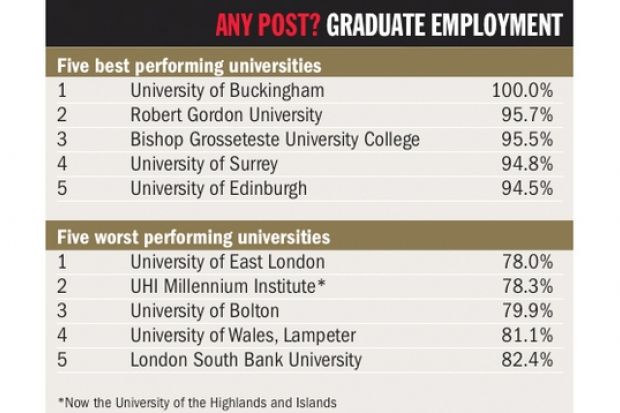A university that finished bottom of the graduate employment rankings has defended its decision to charge tuition fees of £9,000 next year.
One in five students leaving the University of East London last year failed to find a job or enter further study within six months, according to figures released last week by the Higher Education Statistics Agency.
The situation was similar at some other newer universities, including London Metropolitan University, London South Bank University and Birmingham City University, where almost one in five graduates was out of work six months on.
However, while these institutions will charge a range of fees between £4,500 and £9,000 for courses in 2012, UEL will impose a £9,000 fee for all subjects. Average fees after financial support for poorer students will be £8,560.
Selena Bolingbroke, UEL's pro vice-chancellor for strategic planning and external development, said the £9,000 fees were needed across the board to fund "a full range of teaching programmes and research activities".
She said: "Unlike London Met, we have a very broad range of subjects, including law, arts, education and health. We are equipping people with a degree certificate and a set of skills that will set them up for life.
"Even with higher fees, a degree is a worthwhile investment."
An unavoidable dip
She blamed the university's poor performance in the graduate employment statistics for 2009-10 on the recession, which she said had hit UEL graduates harder than others.
"Our graduates tend to stay in East London, and many seek work in the public sector with local authorities and the NHS," she said.
"These areas have been hit hard by recruitment freezes, and unemployment is higher in East London than other areas. However, we have consistently exceeded our benchmarks over the past five years."
Graduates unemployed after three months would be entitled to paid internships as a result of new partnerships with the financial services and telecoms industries, she added.
Other universities also complained that unemployment hot spots in their region had unfairly contributed to their lowly ranking in the Hesa table.
The UHI Millennium Institute (now the University of the Highlands and Islands), which was second worst, said the data were based on just 140 graduates looking for jobs in hard-hit rural Scotland. A spokesman said: "Thirty students were unemployed, but the survey did not ask for supporting information to explain why."
However, some newer universities performed well. Graduates from the University of Huddersfield and the University of Chester, for example, were more likely to be in employment or further study than University of Oxford alumni, the figures show.
The best-performing institution was the private University of Buckingham, which had a 100 per cent employment rate, although the number of its students responding to the Hesa survey - 60 out of a cohort of 75 - was tiny in comparison with those of most other universities.
A number of small and specialist institutions also recorded employment rates of 100 per cent, including Ravensbourne, a digital media and design college; the Royal College of Music; and the School of Pharmacy, University of London.
Besides Buckingham, the highest-ranked universities were Robert Gordon University (95.7 per cent) and the University of Surrey (94.8 per cent).
• Note: Performance by proportion of 2009-10 graduates in employment or further study six months after leaving. Tables exclude small and/or specialist colleges.
Register to continue
Why register?
- Registration is free and only takes a moment
- Once registered, you can read 3 articles a month
- Sign up for our newsletter
Subscribe
Or subscribe for unlimited access to:
- Unlimited access to news, views, insights & reviews
- Digital editions
- Digital access to THE’s university and college rankings analysis
Already registered or a current subscriber?
